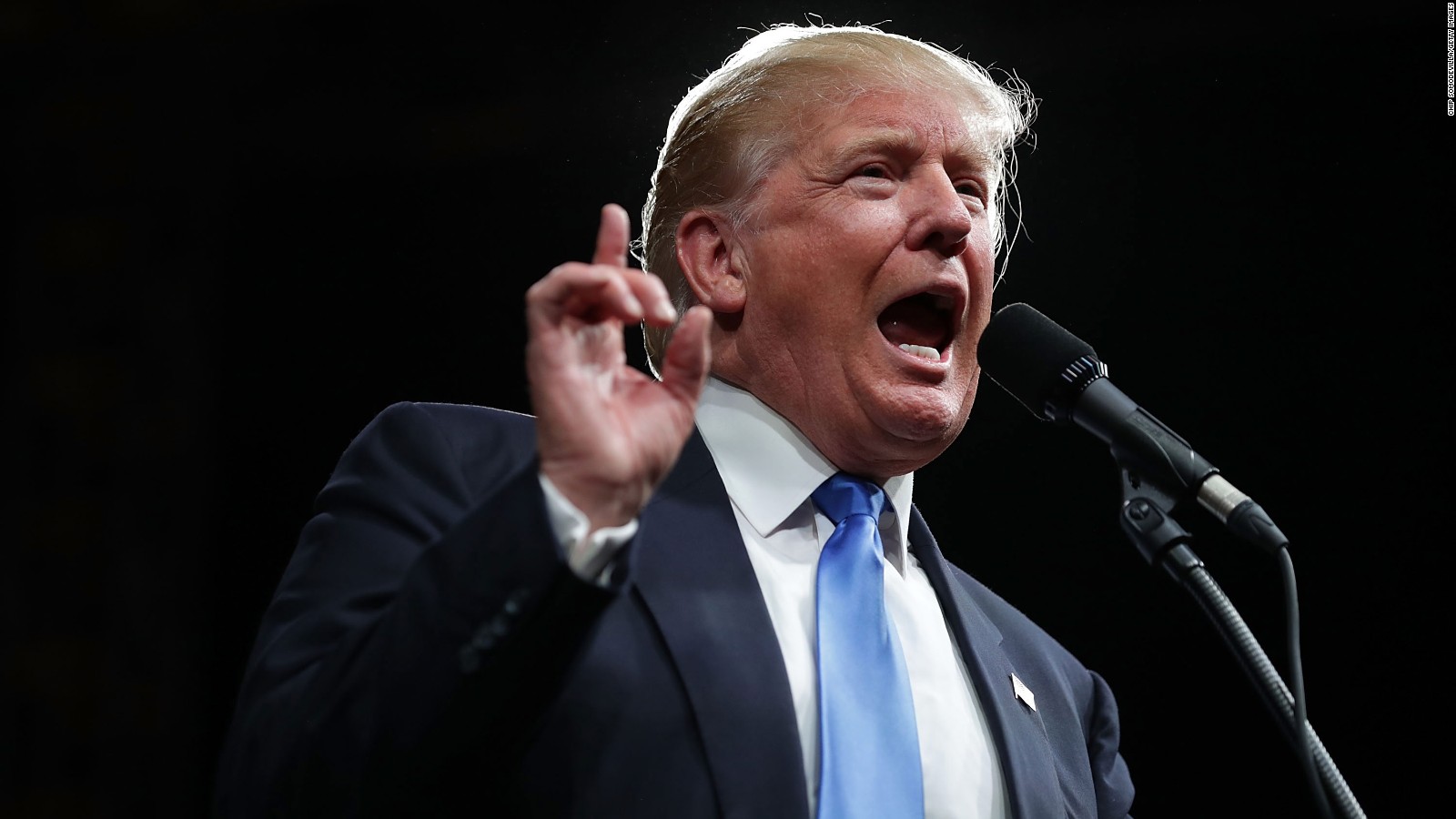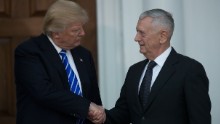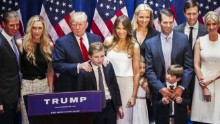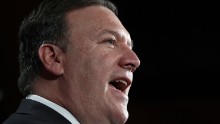begin quote from:
Taking aim at First Amendment
Trump takes aim at First Amendment
Story highlights
- Trump's flag burning tweet seemed to look past two Supreme Court rulings
- Big question is whether Trump's comments should be interpreted as a sign of intent
(CNN)In
51 days, Donald Trump will swear to preserve, protect and defend the
Constitution. But judging from his red hot Twitter feed, Trump is
already chafing at its constraints.
The President-elect called Tuesday for punishing anyone
who burns the American flag by "perhaps" jailing them -- or even
stripping them of citizenship. The Twitter broadside revived concerns
that the incoming President isn't fully aware of the limits he will face
in office or that he may try to eliminate as many curbs as possible.
The
early morning blast was classic Trump, picking at an emotive political
scar that enlivens his most loyal supporters, hijacking news coverage
and forcing everyone in Washington to respond to his own controversial
views -- and then wonder if he really means it. It's a tactic familiar
from the presidential campaign when Trump's mastery at wielding Twitter
as a weapon was at the heart of his battle plan that demolished the Bush
and Clinton political dynasties.
But
the tweet was especially notable because it seemed to look past two
Supreme Court rulings that held flag burning is form of free speech
protected by the First Amendment. The late Justice Antonin Scalia, who
Trump has lauded as a judicial hero and model for his future nominees,
was a crucial vote supporting the majority in each case.
The
big question is whether Trump's comments, which would be extraordinary
coming from any other incoming president, should be interpreted as a
sign of intent or simply another example of the unusual way in which he
blows off steam so publicly.
'Remarkable'
"It
is pretty remarkable that the President-elect of the United States is
calling for penalties, criminal penalties for protected speech," said
CNN senior legal analyst Jeffrey Toobin on Tuesday. "Why is he doing
this? That is the question. Is he trying to distract attention from
something else? I don't know why he would be, his transition seems to be
going pretty well. What is the purpose behind this? I don't really get
it."
David Axelrod, a CNN political
analyst and former strategist for President Barack Obama, encouraged
his Twitter followers Tuesday to pay less attention to what Trump says
and more to how he behaves.
"Pressing
issue of the day? Best to ignore, unless & until it becomes
something more than an AM red meat serving from Dr. Trump & Mr.
Tweet," Axelrod tweeted.
Still, the
spectacle of a President-elect calling for someone to be disowned by
their nation for exercising their constitutional rights -- albeit while
acting in a way many Americans find distasteful -- is a shocking one.
It
is extraordinarily difficult for the federal government to strip a
natural born American of their citizenship. Such a move requires an act
of will upon the part of the person, such as treason. And given the
checks and balances of the political system, it's unlikely that Trump
could enact a law corresponding with his tweet that would withstand a
court challenge.
Yet
one reason Trump's salvos get so much attention is because he has
frequently left the impression that as president, he will nudge right up
against the Constitution.
His
proposal for a ban on Muslim immigration during the campaign -- since
watered down -- appeared to conflict with the constitutional guarantees
of religious freedom.
Some legal
analysts, meanwhile, have warned that that the Emoluments clause in the
Constitution -- which bars gifts being paid to top officials from
foreign governments -- could trip Trump up if he fails to draw a firm
line between his global business interests and his administration.
Trump
also sparked alarm when he told journalists at The New York Times this
month that "the law is totally on my side, meaning, the President can't
have a conflict of interest."
Attacks on news organizations
Trump's
attacks on news organizations, including CNN and The New York Times,
have also worried those who fear he has the First Amendment in his
sights. He warned during the campaign that he would "open up" libel laws
to make it easier for him to sue news organizations if he was elected
president.
But one of the emerging
characteristics of Trump's presidential transition that is likely to
linger on in his administration is the difficulty in discerning exactly
how serious to take his threats and bluster.
Asked
by New York Times Chief Executive Officer Mark Thompson in the meeting
with the paper's journalists and executives whether he respected the
First Amendment, Trump was conciliatory.
"I think you'll be happy," he said. "I think you'll be happy ... I think you'll be O.K. I think you're going to be fine."
Some Democrats, wary of presidential overreach, say there's no choice but to take Trump at his word.
"When
do we take Donald Trump seriously? My answer to that question is
February 2016, when none of us took him seriously and now he is the
President-elect," said Mark Alderman, a Democratic strategist and former
Electoral College elector.
"I am
done not taking him seriously," said Alderman, who is chairman of Cozen
O'Connor Public Strategies. "I have at least learned that lesson. I
think everything that the man does has to be taken seriously because he
has demonstrated over the last 18 months that he was serious about being
nominated."
He added: "He was
serious about being elected. It would be a mistake to say he is not
serious about governing and serious about what he says about governing."
The
White House took Trump's remarks at face value, warning that there
should be no infringements on free speech, even though most Americans
oppose flag burning.
"The freedom
that we all have to express ourselves in the way that we chose to do so
is protected by the United States Constitution," White House spokesman
Josh Earnest said Tuesday. "The need to protect those rights is in place
to protect speech and expression not just when we agree with it but
also when we find it offensive."
Republican
Senate Majority Leader Mitch McConnell parried questions about Trump's
comments by framing the constitutional position on flag burning as a
decided issue.
"The Supreme Court
has held that activity is a protected First Amendment right, a form of
unpleasant speech and in this country, we have a long tradition of
respecting unpleasant speech," McConnell said. "I happen to support the
Supreme Court's decision on that matter."
GOP's default posture
Deflecting
and ignoring a politically loaded Trump tweet could become a default
Republican posture once the President-elect is sworn in. But one top
Republican seems to have enough of it already.
Arizona Sen. John McCain, who chairs the Armed Services Committee, told CNN's Manu Raju Tuesday
that he doesn't like flag burning, which he sees as an insult to his
fellow veterans. But he noted that it has been decreed an act of free
speech and wouldn't talk about Trump.
"I
have not been commenting on Mr. Trump and I will continue not to
comment on Mr. Trump," McCain said. "My time is devoted to trying to
make sure this nation is secure, not to comment on every comment of Mr.
Trump's."

















No comments:
Post a Comment